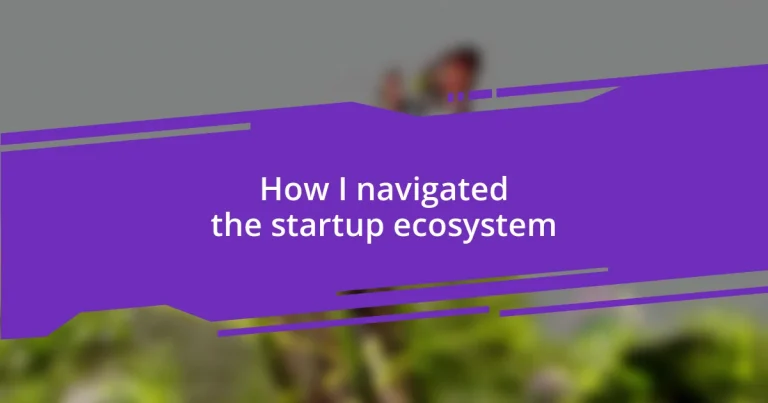Key takeaways:
- Networking is essential; building genuine relationships with key players like founders, investors, and mentors can significantly influence your startup journey.
- Leveraging mentorship and advice from experienced individuals helps navigate challenges and fosters growth, simultaneously improving your product and approach.
- Measuring success involves understanding customer needs and team dynamics, ensuring your startup can scale effectively while maintaining a unified mission.
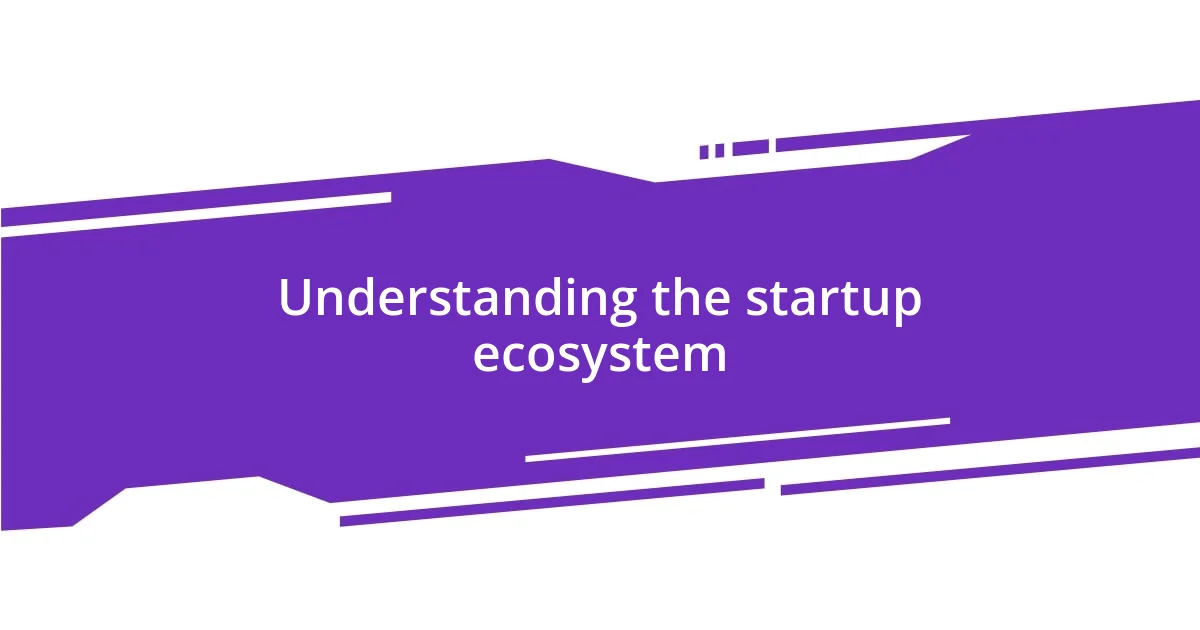
Understanding the startup ecosystem
To truly understand the startup ecosystem, it helps to think of it as a living organism, where each part must work harmoniously to thrive. In my early days, I remember feeling overwhelmed by the multitude of connections and opportunities around me. How do you even begin to navigate that maze? One crucial realization was that networking isn’t just a buzzword; it’s the lifeblood of your journey.
I vividly recall attending my first startup meetup, nervously clutching my coffee cup while observing the dynamic conversations around me. The energy in the room was palpable! It became clear that building relationships with other entrepreneurs, investors, and mentors was essential—not simply for funding, but for learning and growth. Have you ever felt out of your depth in a new environment? I know I did, yet those moments of discomfort often led to the most valuable connections.
Moreover, understanding the various stages of a startup—seed, growth, and scaling—can equip you with the knowledge needed to make strategic decisions. When I launched my first venture, I often found myself stuck between seeking immediate traction and planning for long-term sustainability. It’s a balancing act that requires not just insight but intuition. How do we navigate these complexities without losing sight of our vision? By recognizing that every setback provides lessons that pave the way for future success, I learned to embrace each twist and turn along the way.
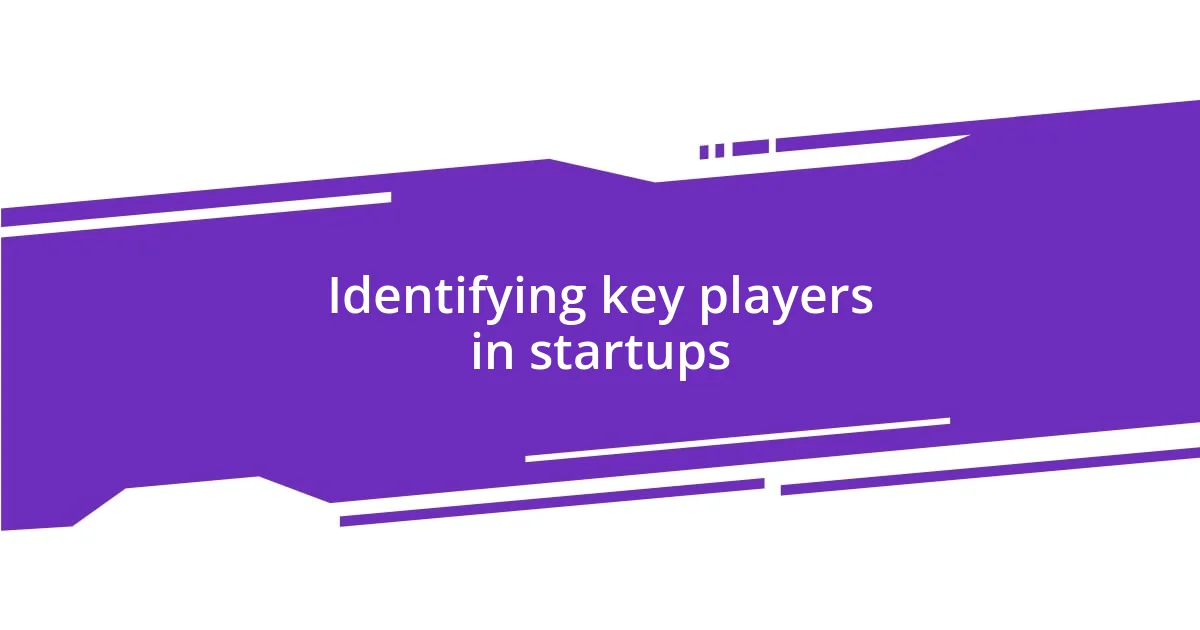
Identifying key players in startups
Identifying key players in the startup ecosystem is crucial for any entrepreneur starting their journey. From my experience, the main players include founders, investors, mentors, and industry experts. Every connection I made opened doors I didn’t even know existed. For instance, during a networking event, I struck up a conversation with a mentor who had successfully scaled multiple startups. This informal chat not only provided me with invaluable insights but also forged a lasting alliance that I still cherish.
As I navigated this landscape, I learned to differentiate between different types of investors. Angel investors often provide the initial capital and guidance, while venture capitalists can propel a startup to greater heights during scaling phases. Reflecting on my own encounters, I remember an angel investor’s fascination with my pitch led to more than just funding; it guided me to refine my business model. Are you aware of who can provide the capital and support your startup needs? You’ll find that understanding their distinct roles can shape your approach to fundraising and strategic growth.
The relationships I built often pointed me toward industry-specific experts who could assist with niche challenges. For example, a chat with a marketing specialist helped me navigate customer acquisition more smoothly. The beauty of the ecosystem lies in its collaborative nature—everyone brings unique expertise to the table. Have you ever discovered a connection that transformed your understanding? Embracing those moments can enhance your overall journey, making the startup world less daunting and more interconnected.
| Key Player | Role |
|---|---|
| Founders | Visionaries who drive the startup’s mission |
| Investors | Provide financial support, mentorship, and networks |
| Mentors | Offer guidance and advice based on experience |
| Industry Experts | Help navigate specific challenges within the sector |
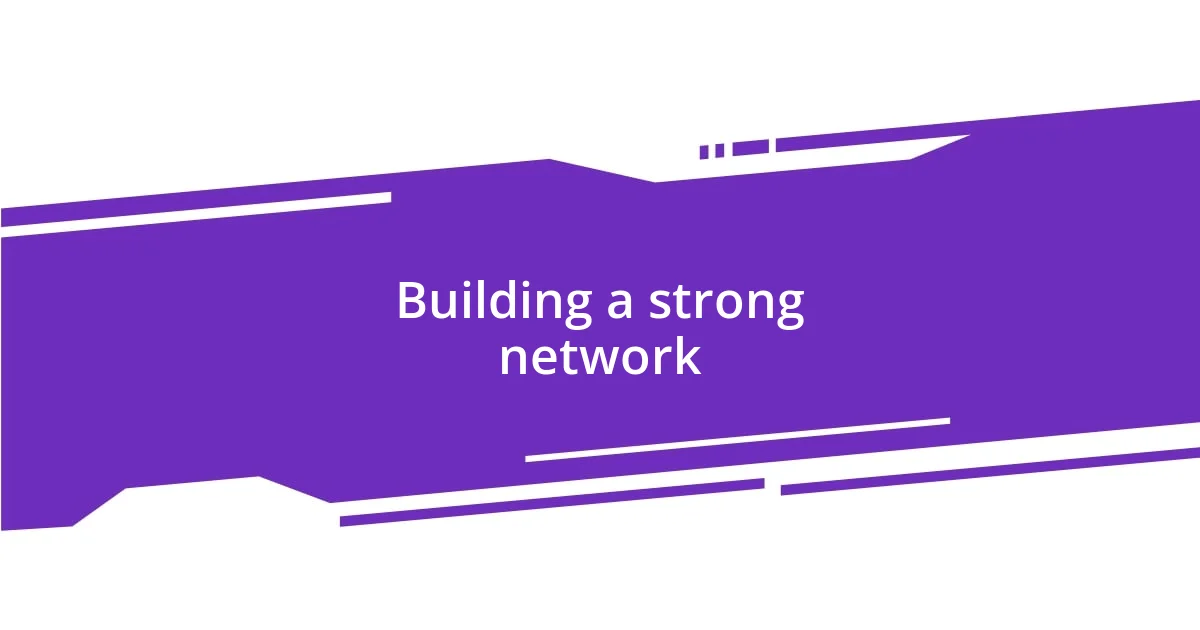
Building a strong network
Building a strong network is vital in the startup ecosystem, as connections can significantly influence your journey. I remember a particularly enlightening experience when a fellow entrepreneur reached out to me after hearing my pitch at a function. We bonded over our shared challenges and soon found ourselves exchanging ideas, strategies, and even personal anecdotes about failures we faced. That connection became a springboard for both of us, propelling our ventures in unexpected ways. It taught me the importance of not just making contacts but nurturing genuine relationships.
Here are a few key strategies I’ve employed to build and maintain a strong network:
- Attend Industry Events: Engaging with others face-to-face allows for more meaningful interactions.
- Follow Up: A quick message after meeting someone can go a long way in solidifying a connection.
- Be Genuine: People appreciate authenticity. Share your struggles and triumphs, and don’t be afraid to ask for advice.
- Offer Help: Don’t just take; think about how you can provide value to others. It creates a reciprocal relationship.
- Utilize Social Media: Platforms like LinkedIn are great for maintaining connections and sharing your journey.
I find that the more I invested in my relationships, the more I received in return—knowledge, support, and sometimes even unexpected partnerships. It’s all about building a community where mutual growth is encouraged.

Securing funding for your startup
Securing funding for a startup can feel like scaling a mountain, but it’s all about preparation and connection. When I was actively seeking investors, I refined my pitch to highlight not just the numbers, but the story behind my startup. I often asked myself: how can I make them feel the passion behind what I’m building? One time, after fine-tuning my presentation based on feedback, I landed a meeting with a group of angel investors. Their enthusiastic nods and follow-up questions made it clear that my story resonated with them.
As I navigated funding avenues, I quickly learned the importance of being strategic about who I approached. For example, I remember targeting a venture capital firm that specialized in my industry. This was a game changer. They not only provided funding but offered insights that helped me pivot my strategy. Have you thought about how aligning with the right investors can amplify your growth trajectory? It’s about creating partnerships that go beyond financial support—those relationships can shape your startup’s future.
Networking events became my playground for securing funds. I recall one evening when I met an investor who wasn’t just interested in my pitch but genuinely curious about my journey. I shared my challenges, my vision, and surprisingly, it sparked a collaborative discussion about industry trends. Through that connection, I was able to secure not just funding, but invaluable mentorship. Can you imagine how different your startup journey could be with the right financial backing and guidance? It’s all out there; you just have to connect the dots.
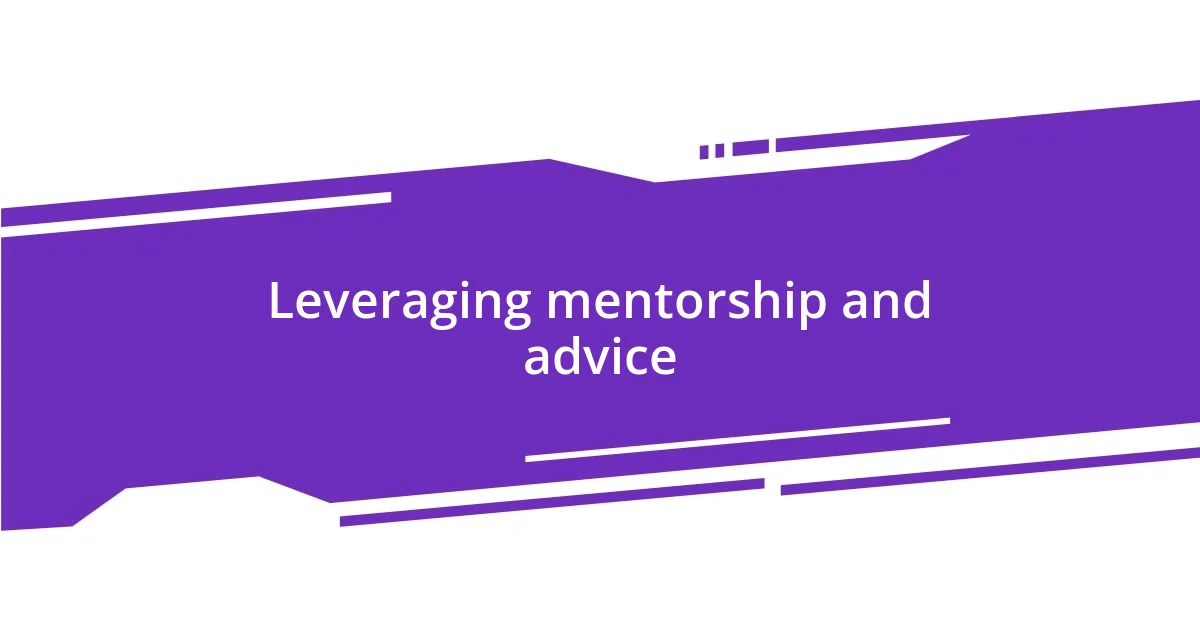
Leveraging mentorship and advice
Mentorship played a crucial role in my startup journey, and I can’t emphasize enough how transformative it can be to seek guidance from those who have walked the path before you. After my initial struggles in product development, I reached out to a seasoned entrepreneur who specialized in my niche. Our conversations often revolved around the decisions that led to their successes and pitfalls. I remember one piece of advice that hit home: “Never underestimate the power of iteration.” It was a lightbulb moment for me, sparking a shift in how I approached feedback and adapting my product.
I’ve also found that mentorship doesn’t have to come exclusively from formal relationships. During a particularly challenging time, I turned to a group of peers who were also navigating their startups. We met weekly, sharing our challenges and brainstorming solutions. One night, as we debated how to approach a marketing strategy, someone out of the blue suggested a method that became our winning formula. It’s incredible how informal support networks can sometimes yield the most profound insights. Have you considered looking beyond traditional mentorship models?
In today’s ever-evolving landscape, the advice I received was often linked to industry trends that felt just out of my grasp. At one point, a mentor guided me through understanding market demands. They broke it down with simple questions: “What problem are you solving? Who feels that pain?” Those dialogues not only clarified my mission but ignited a passion to align my product with real-world needs. I began to embrace the idea that mentorship is not just about advice—it’s about fostering a mindset that recognizes opportunities for growth, both personally and professionally. How often do you reflect on the advice you’ve received and actively apply it to new challenges?
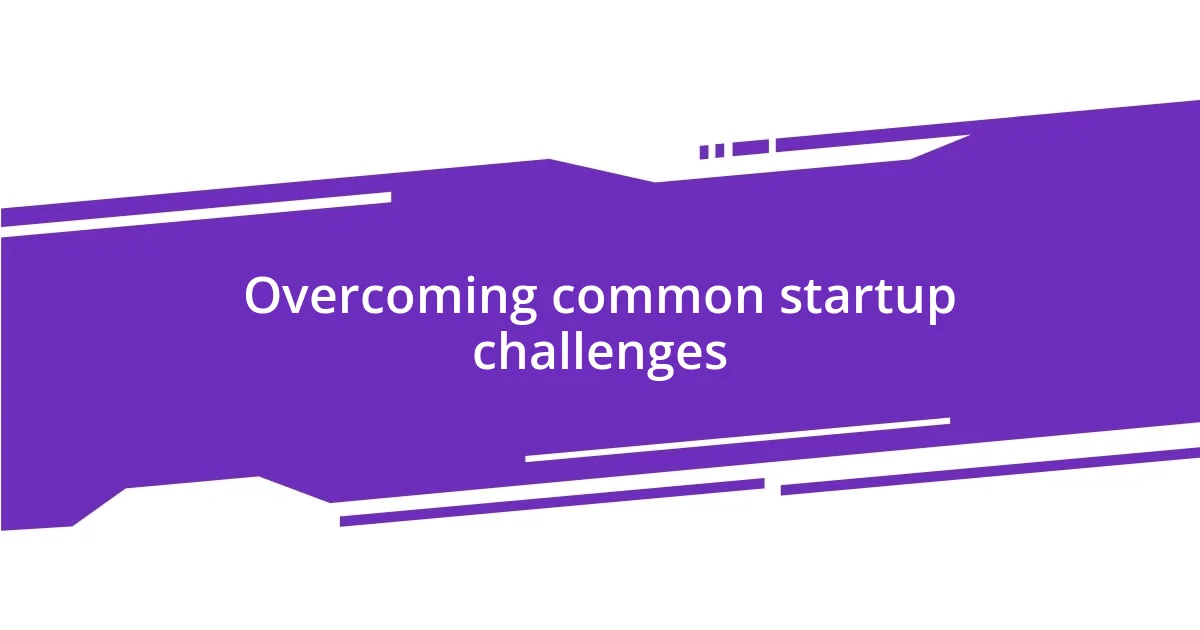
Overcoming common startup challenges
Navigating the startup landscape isn’t without its hurdles, especially when it comes to team dynamics. I vividly remember a period when my founding team faced conflicts over our vision. It felt disheartening; how could we innovate if we were at odds? To tackle this, I organized a series of candid discussions where everyone could voice their concerns. Those sessions were surprisingly cathartic. By allowing space for open dialogue, we discovered shared goals that reignited our passion and united us. Have you ever experienced a disconnect within your team? Sometimes, just having a conversation can bridge that gap.
Another significant challenge was managing time effectively amidst chaos. As a founder, it’s easy to feel overwhelmed by countless tasks, with deadlines looming every day. There was a time when I felt like I was running in circles, constantly putting out fires. It was exhausting! I decided to implement a prioritization framework inspired by the Eisenhower Matrix, categorizing tasks by urgency and importance. This shift transformed my productivity. I realized that not everything demanding my attention was crucial. How do you decide what to focus on when everything feels important?
Finally, finding and retaining customers proved to be a learning curve. In the early days, I was quick to celebrate every small sale, but it became clear that building relationships was vital. I recall reaching out to a customer after a purchase, just to see how they were faring with the product. That simple call not only led to invaluable feedback but also fostered loyalty. It struck me that engaging authentically with customers can cultivate a community around your brand. Have you thought about how meaningful connections can transform your customer relationships? Each interaction is a chance to learn and grow, turning customers into advocates.
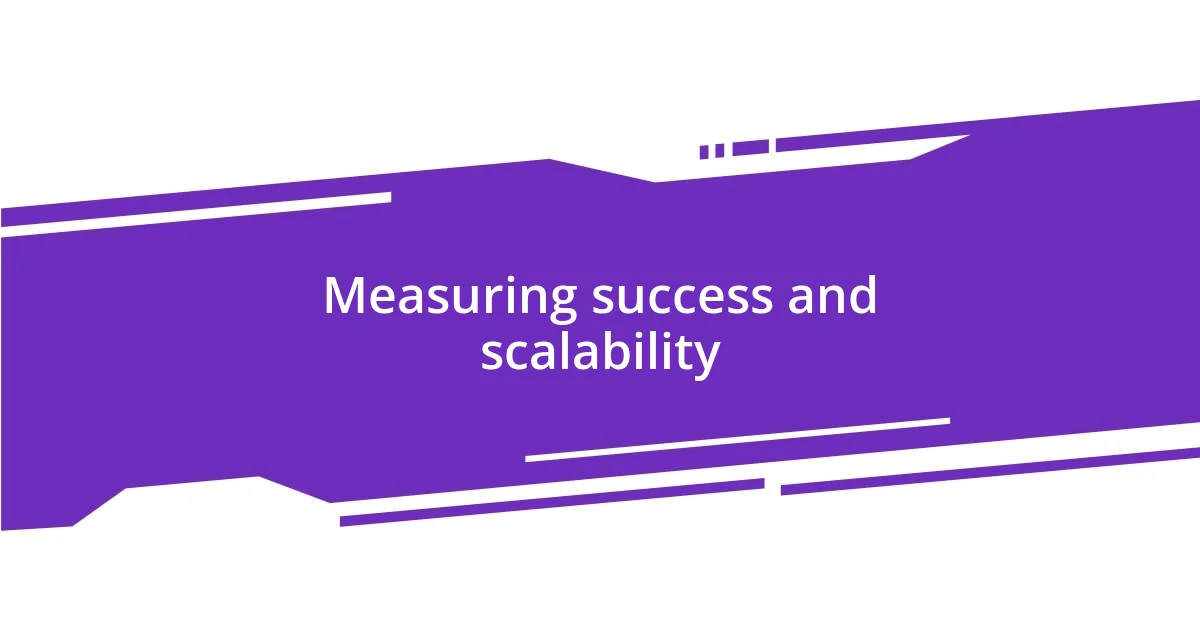
Measuring success and scalability
Measuring success in the startup world can often feel nebulous, but I’ve come to view it through a multi-dimensional lens. For me, it wasn’t just about revenue growth or user acquisition; it was about understanding how well I was meeting my customers’ needs. I remember tracking customer satisfaction through surveys and informal chats, and one particular conversation with a client led me to realize we were missing a vital feature. That moment helped steer our roadmap significantly. Are you closely listening to your customers to gauge your success?
As I navigated the idea of scalability, I became acutely aware that scaling isn’t a one-size-fits-all solution. Early on, our growth strategies seemed promising, yet execution fell flat. I learned that a robust infrastructure is essential. During a major product launch, we faced server issues that halted our progress. My heart dropped. Reflecting on that setback, I understood that scalability involves not only increasing output but also ensuring that your systems can support that growth. How prepared are you for the unexpected challenges that come with scaling?
I also believe that success should factor in team dynamics and culture, which are often overlooked. Scaling a team too quickly can lead to misalignment. After a significant hire, I found our once-unified team was suddenly speaking different languages in terms of goals and objectives. It was a wake-up call. I initiated team alignment workshops that nurtured clarity and collaboration. Suddenly, the energy shifted back to our shared mission. How do you maintain team cohesion as your startup grows? Finding harmony amid expansion can truly define your success.












